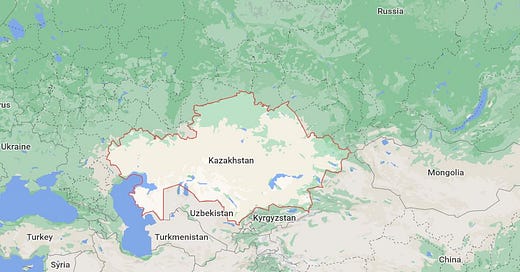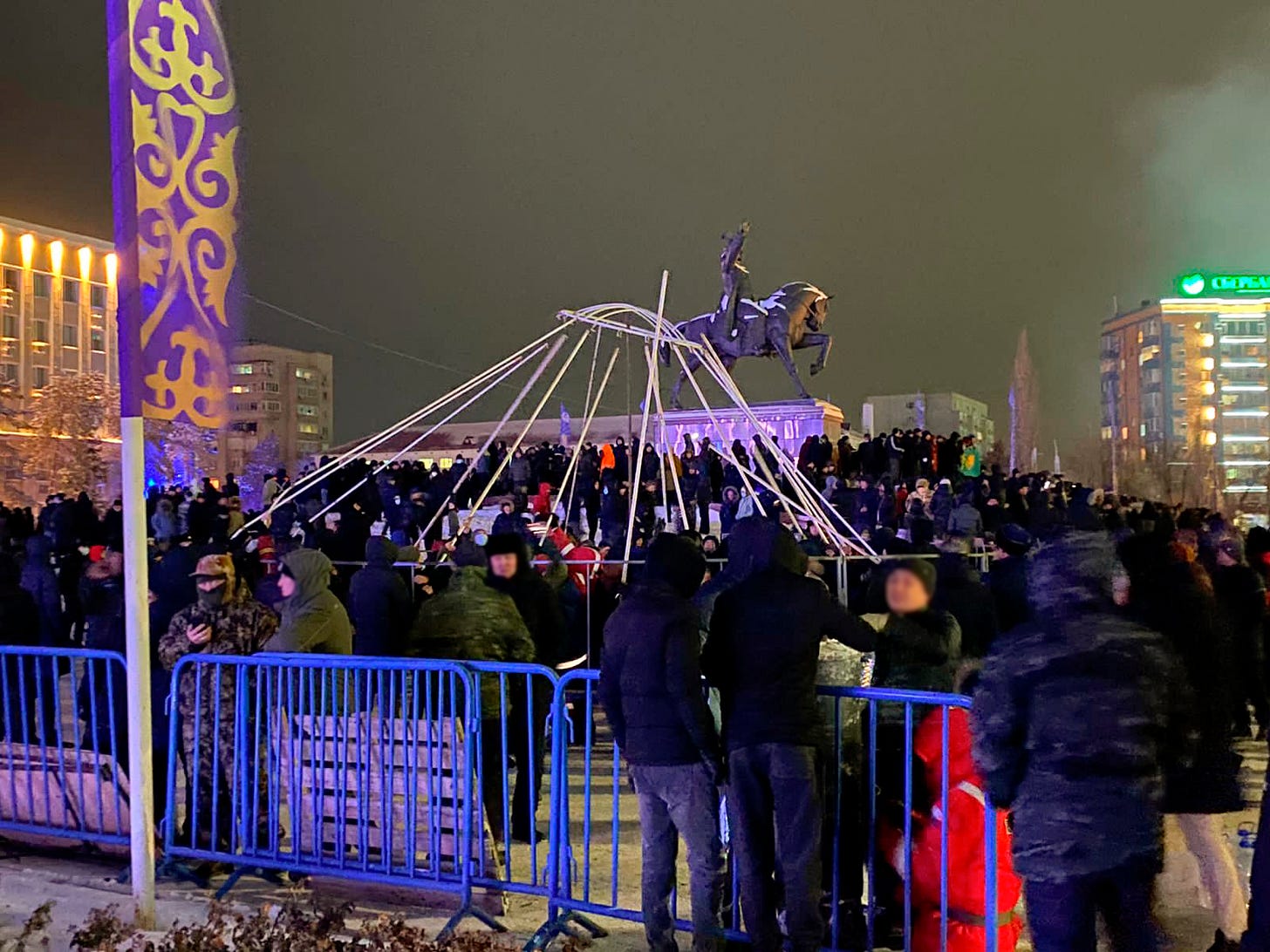What is happening in Kazakhstan, and how did it become so global?
These are the worst protests Kazakhstan has seen since it declared independence from the Soviet Union three decades ago, with over 160 deaths and nearly 8,000 detentions.
Welcome to the 60th issue of The Supplement, a newsletter that fills in the gaps of your other news intake. This is Sierra, one-third of The Supplement team!
Each week, we pick a question submitted by you, our readers. If you’d like to submit a question for a future week, then email us at thesupplementnewsletter@gmail.com or reach out to us on Twitter or Instagram.
Welcome to 2022! If you like what you read each week, consider buying us a coffee ☕
This week, we’re tackling this question: What is happening in Kazakhstan, and how did it become so global?
TL;DR: Having powerful, rich neighbours geographically doesn’t always fare well for those countries who stand in between, especially when they have resources. This is one part of the situation in Kazakhstan. The other aspect of the situation is familiar too: people who are tired of corrupt politics, economic disparities, and an unresponsive government. This is where we set the stage for the violence this week that led to over 160 deaths and nearly 8,000 detentions.
Over on our Instagram stories this weekend, we asked you how much you felt you knew about this issue. Overall our followers weren’t feeling too confident — so we’re starting off basic this week and introducing more detail later on in the newsletter.
There’s a lot of information, so let’s get straight to it.
With Russia to the north and China to the south, Kazakhstan is the largest country in Central Asia and the world’s largest landlocked country. It’s about five times the size of France, making it the ninth-largest country.
It has a population of about 19 million — and unfortunately, I’m sure there are more than a few people who might have first been introduced to this region through the movie Borat.
Most people might consider visiting Kazakhstan for its unique cultures and landscapes, but outside of its tourist attractions, it’s also known for oil. It is right behind the U.S. in terms of crude oil reserves and has the largest reserves in the Caspian Sea area, making oil the main driver of its economy. Not only that, but Kazakhstan is also mineral rich: in 2017, mining contributed to about 30 per cent of export earnings and nearly 10 per cent of the national GDP.
Read: Kazakhstan has ties with other countries, including the U.S. and Canada on energy investments.
What is happening right now?
These are the worst protests Kazakhstan has seen since it declared independence from the Soviet Union three decades ago.
Recent reports show nearly 8,000 have been detained in the protests. Jan. 10 was declared a day of mourning — the health ministry said 164 people were killed, including three children.
But President Kassym-Jomart Tokayev has been referring to protestors as “bandits and terrorists”, and called on Russia for help to quell the protests (more on that later).
It’s noteworthy that Russia is trying to assert its power elsewhere during this time. (We wrote about Russia-Ukraine relations last month.) Russia is also involved in the Belarus-Poland border unrest, which happens to be the country standing between Russia and Ukraine. As the New York Times writes, “countries of the former Soviet Union are also watching the protests closely.”
Kazakh people are angry, why?
After price caps were lifted on Jan. 1, there was a sudden rise in fuel prices (nearly doubling!). That, paired with long-existing frustrations over the nation’s political and economic situation, was what sparked recent protests last week, continuing even after the price caps were reinstated.
Despite being an oil-rich nation, with elites who benefit from the country’s natural resources and foreign investments, the general population doesn’t see the same wealth.
According to the government website, the average monthly salary is the equivalent to just under $725 CAD. According to the Times, many people earn far less than that. And while Canada’s average inflation rate for 2021 was around 4.4 per cent, Kazakhs saw nearly twice that rate at 8.4 per cent.
The politics
One major slogan from the protests was “old man out,” referring to Nursultan Nazarbayev, former leader of Kazakhstan who had been in power since independence and still holds a role with much sway in the National Security Council. Nazarbayev chose his ally, current president Tokayev, as his replacement.
On Jan. 5, Tokayev announced that he was taking over from Nazarbayev as security council head. Tokayev’s cabinet also resigned. If you really want to learn about who’s who, this is the place.
Tokayev has no opposition in government.
How did things escalate?
Peaceful protests began on Jan. 2, but they turned violent on Jan. 5 when demonstrators began attempting to take over government buildings. They took brief control of the international airport in Almaty, a main city where internet access has just recently been restored since protests started.
Russia-led alliance troops arrived in Kazakhstan the following day, on Jan. 6, by Tokayev’s orders. The “peacekeeping” forces are part of the Collective Security Treaty Organisation led by Russia.
By Jan. 7, Tokayev was ordering police and military to shoot to kill “terrorists” involved in the violence, who he also claim were foreign-backed, but has not said who he blames for it. White House press secretary Jen Psaki said Russian accusations that the U.S. had instigated the unrest were false.
Speaking on Jan. 10, Tokayev said he’ll have proof of foreign interference. Russian President Vladimir Putin echoed that sentiment, calling it “interfering in the internal affairs of our states from the outside.” While China has been relatively quiet on recent events, Chinese President Xi Jinping offered support to Tokayev.
Canadian Foreign Affairs Minister Mélanie Joly called for “restraint and de-escalation” after Russian troops moved in. “We urge that the situation in Kazakhstan be resolved quickly and through peaceful dialogue,” she said.
The Kazakhstan government has declared a national state of emergency until Jan. 19.
Here’s someone to follow:
Kelsie Kilawna’s twitter bio says she is a “Syilx & Secwépemc storyteller, mover & shaker here to disrupt the status quo” and we are all about it. She’s the cultural editor at IndigiNews, which tells stories from Okanagan and Vancouver Island. I loved acquainting myself with the intentions of their outlet, check it out for yourself.
Here’s a story to check out:
Another ~thing~ happened in Canadian media recently, and CANADALAND did a podcast episode about it. Former CBCer Tara Henley said she was stifled by the broadcaster’s “radical political agenda.” Jesse Brown asked her: how so?
And as for a little news to follow up on, Tony Staffieri is now officially president and CEO of Rogers Communications Inc., after serving as the interim. It’s a significant update since we shared our explainer on the Rogers family saga, where the drama started.








